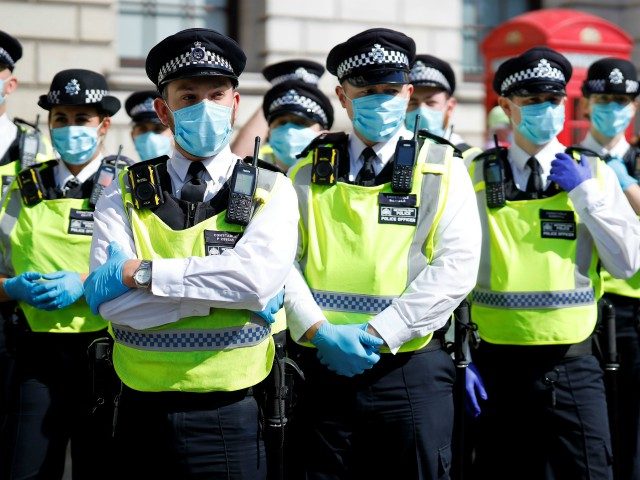Britain’s Conservative government has announced it will be handing over £60 million in taxpayers’ money to police and local councils for enforcing coronavirus laws, including funds for new “marshals”.
Police are set to be more “visible” on the streets of Briton, with officers stepping up patrols to enforce coronavirus restrictions on citizens, with local councils to conduct more inspections of businesses.
The government said on Thursday that of the money to be allocated, £30 million funding would go council ‘compliance’ operations, including Boris Johnson’s “covid-secure marshals”, who the prime minister implied last month would be patrolling the high street to ensure that people do not get too close to one another.
In Thursday’s statement, the government said the marshals would assist with “queue management, direct pedestrians and support social distancing in busy public areas, [and] remind members of the public to wear a face covering where it’s required”.
Also called “ambassadors” or “stewards”, the government said that the marshals would not be able to enforce rules, which remains the role of police — as well as “designated local council enforcement officers”.
Last month, Westminster council “city inspectors” were reported to be peeping through the windows and letterboxes of pubs to ensure they were following the 10 pm curfew. The new rules have sparked confusion with some businesses, with one burger shop being fined £1,000 for handing a burger to a customer at 10:04 pm, despite having started serving him at just before 10 o’clock.
Delingpole: Boris Johnson Has Led a Fascist Coup Against the United Kingdom https://t.co/U9ttNdqLYM
— Breitbart London (@BreitbartLondon) September 10, 2020
If there appears to be more of an authoritative presence in the UK, it may be coming with the helping hand of its citizens. After new social distancing measures were put in place in September, a number of government ministers encouraged Britons to snitch on their neighbours if they saw them breaking coronavirus rules.
In one instance, a woman said it was her “public duty” to call the police on a funeral wake in a pub garden because she thought people were standing too close to one another. Police forces said that Britons had been so eager to inform on one another that some constabularies had had to bring on extra telephony staff to deal with the increase in calls.
Police forces were heavily criticised for their enforcement of the government’s springtime lockdown, where Britons were instructed not to leave the house unless it was necessary, with police patrolling parks and beaches to order people home.
They also forced businesses to close, such as those selling mobile phones and bakeries, for allegedly not being ‘essential’, and were reported to have scolded small shops for selling chocolate Easter eggs, because, again, they were deemed ‘not essential’.
Derbyshire Police went to extraordinary lengths to stop Britons enjoying the splendour of the countryside, including pouring black die into a lagoon to dissuade swimmers, and stalking dog walkers with drones, later uploading the footage to publicly shame them for taking non-essential walks. Former Supreme Court judge Lord Sumption criticised the force, and likened its actions to a “police state”. Big Brother Watch called the drones episode “frankly sinister”.
Man Scolded for Cuddling Grieving Elderly Mother at Social-Distanced Funeral https://t.co/d347u8dtvQ
— Breitbart London (@BreitbartLondon) October 6, 2020
Lancashire Police suspended an officer in April for threatening to make up an offence in order to arrest someone during the lockdown, with the officer asking the man: “Who are they going to believe? Me or you?” Warrington Police had proudly admitted to slapping fines on one man for going for a drive out of boredom, and to a group of people from the same household going to the shops “for non-essential items”.
Nearly 9,000 fixed penalty notices had been issued by the end of April in England alone. But by the beginning of May, the Crown Prosecution Service ordered a review of all coronavirus lockdown-related convictions after reports that overzealous police had wrongfully charged people.
The restrictions have also had a devastating effect on how people are treated when they are at their most vulnerable or fragile. Breitbart London reported this week that a funeral director in Milton Keynes interrupted a service and ordered a son to stop comforting his elderly mother who had become upset over the death of her husband, with the event on hold until he had moved away from the grieving woman.
The crematorium staff member is heard scolding the man and another who came to the aid of the woman, saying: “You can’t move the chairs, you were told.”
Police Hunt Man Dressing as ‘Plague Doctor’ as Lockdown Fines Soar https://t.co/MJcQgBQllS
— Breitbart London (@BreitbartLondon) April 30, 2020

COMMENTS
Please let us know if you're having issues with commenting.